When it comes to compact SUVs, the BMW X1 and Hyundai Tucson represent two distinct approaches to engineering, design, and driving pleasure. In this comparison, we'll delve into the technical specifications and innovations that set these vehicles apart, helping potential buyers make an informed decision.
BMW X1 vs Hyundai Tucson - Differences and prices compared
Compare performance (326 HP vs 288 HP), boot space and price (38200 £ vs 20900 £ ) at a glance. Find out which car is the better choice for you – BMW X1 or Hyundai Tucson?
Design and Dimensions
The BMW X1 measures up with a length of 4500 mm, a width of 1845 mm, and a height varying slightly between 1622 mm and 1642 mm depending on the variant. It offers a striking and sporty appearance consistent with the BMW brand.
In contrast, the Hyundai Tucson is marginally larger, with a length between 4510 mm and 4520 mm, a width of 1865 mm, and a height of 1650 mm. Its more aggressive design boasts bold lines and an eye-catching front fascia, aiming to attract a different clientele.
Engine and Performance
The BMW X1 comes with several engine options, including diesel, petrol, mild hybrid, and plug-in hybrid models. Its power range stretches from 136 HP to an impressive 326 HP for the more performance-oriented variants. Depending on the configuration, the X1 can accelerate from 0 to 100 km/h in as little as 5.4 seconds, making it a sporty choice in the compact SUV segment.
On the other hand, the Hyundai Tucson offers a robust lineup of conventional and hybrid engines, with power outputs ranging from 136 HP to 252 HP. The Tucson's acceleration ranges from 7.9 to 11.4 seconds for the 0 to 100 km/h sprint, which is respectable but less performance-focused compared to the X1.
Fuel Efficiency and Eco-Friendly Options
With growing consumer interest in efficiency, both models provide commendable fuel economy. The BMW X1 offers a fuel consumption range of 4.6 to 7.7 L/100km, depending on the engine choice. Its plug-in hybrid variant boasts an electric range of up to 83 km, making it suitable for short urban commutes without relying heavily on fuel.
The Hyundai Tucson also competes well in this category, with a consumption range of 5.1 to 6.8 L/100km. Its plug-in hybrid offers an electric-only range of up to 70 km, making it an appealing option for eco-conscious drivers.
Interior and Technology
Both vehicles accommodate five passengers comfortably, but the approach to interior design differs. The BMW X1's interior exudes a premium feel, featuring high-quality materials and an intuitive infotainment system. Key innovations include the latest iDrive system with a high-resolution display that integrates navigation and vehicle settings seamlessly.
In comparison, the Hyundai Tucson focuses on spaciousness and practicality. It offers a slightly larger trunk capacity, ranging from 546 to 620 liters, empowering users with ample storage flexibility. The Tucson also features a user-friendly infotainment system equipped with advanced connectivity options, including Apple CarPlay and Android Auto.
Safety and Driving Experience
Safety remains a priority for both manufacturers, with a host of advanced driver-assistance systems (ADAS) available. The BMW X1 includes features like adaptive cruise control, lane departure warning, and parking assistance, emphasizing its commitment to a safe driving experience.
Similarly, the Hyundai Tucson is outfitted with numerous safety technologies, such as forward collision avoidance assist, blind-spot monitoring, and rear cross-traffic alert, aiming to enhance driver confidence. Both models have received positive safety ratings, showcasing their robust build quality and innovative safety features.
Final Thoughts
Choosing between the BMW X1 and Hyundai Tucson boils down to personal preferences and priorities. The X1 leans towards performance and luxury, ideal for those who appreciate a sporty drive in a compact package. The Tucson, on the other hand, excels in practicality and value, making it an excellent choice for families and everyday use.
Ultimately, both SUVs bring unique strengths to the table and cater to different segments of the market, making this rivalry an exciting one in the automotive world.
Here’s where it gets real: The technical differences in detail
Costs and Efficiency:
Looking at overall running costs, both models reveal some interesting differences in everyday economy.
Hyundai Tucson has a convincingly advantage in terms of price – it starts at 20900 £ , while the BMW X1 costs 38200 £ . That’s a price difference of around 17331 £.
Fuel consumption also shows a difference: BMW X1 manages with 2.50 L and is therefore hardly perceptible more efficient than the Hyundai Tucson with 2.70 L. The difference is about 0.20 L per 100 km.
As for electric range, the BMW X1 performs somewhat better – achieving up to 81 km, about 11 km more than the Hyundai Tucson.
Engine and Performance:
Under the bonnet, it becomes clear which model is tuned for sportiness and which one takes the lead when you hit the accelerator.
When it comes to engine power, the BMW X1 has a a bit edge – offering 326 HP compared to 288 HP. That’s roughly 38 HP more horsepower.
In acceleration from 0 to 100 km/h, the BMW X1 is evident quicker – completing the sprint in 5.40 s, while the Hyundai Tucson takes 7.50 s. That’s about 2.10 s faster.
In terms of top speed, the BMW X1 performs to a small extent better – reaching 233 km/h, while the Hyundai Tucson tops out at 204 km/h. The difference is around 29 km/h.
There’s also a difference in torque: BMW X1 pulls clearly perceptible stronger with 477 Nm compared to 379 Nm. That’s about 98 Nm difference.
Space and Everyday Use:
Cabin size, boot volume and payload all play a role in everyday practicality. Here, comfort and flexibility make the difference.
Both vehicles offer seating for 5 people.
In curb weight, Hyundai Tucson is slight lighter – 1542 kg compared to 1575 kg. The difference is around 33 kg.
In terms of boot space, the Hyundai Tucson offers somewhat more room – 620 L compared to 540 L. That’s a difference of about 80 L.
In maximum load capacity, the Hyundai Tucson performs to a small extent better – up to 1799 L, which is about 254 L more than the BMW X1.
When it comes to payload, Hyundai Tucson hardly perceptible takes the win – 545 kg compared to 500 kg. That’s a difference of about 45 kg.
Who wins the race in the data check?
The BMW X1 holds a narrow overall lead in the objective data comparison.
This result only shows which model scores more points on paper – not which of the two cars feels right for you.
Costs and Consumption
View detailed analysis
Engine and Performance
View detailed analysis
Dimensions and Body
View detailed analysis
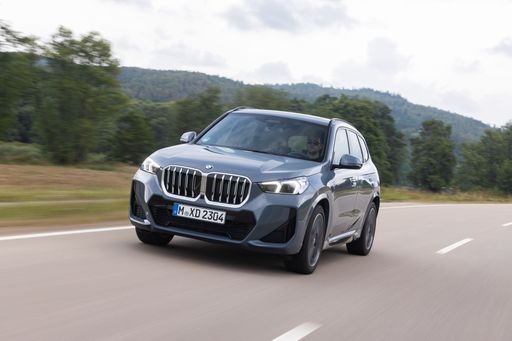
BMW X1
BMW X1
The BMW X1 brings a premium feel to compact crossover life, wrapping practical space and agile handling into a tidy, upscale package. It’s ideal for buyers who want BMW driving dynamics without the bulk, offering everyday comfort and a few clever tricks to keep the commute interesting.
details
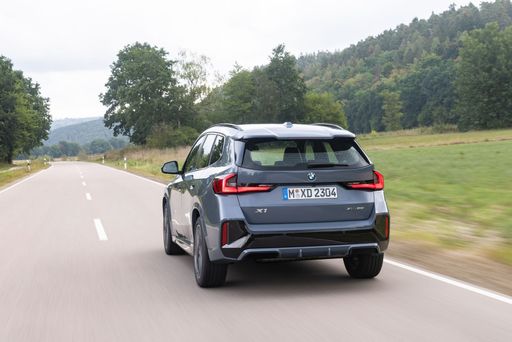
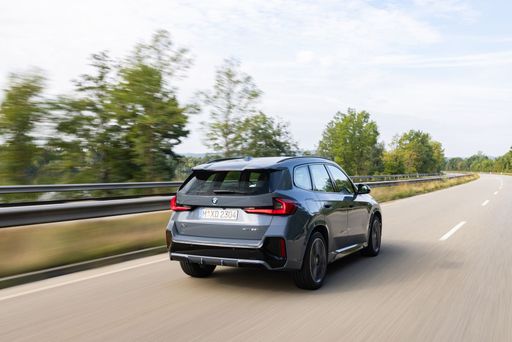
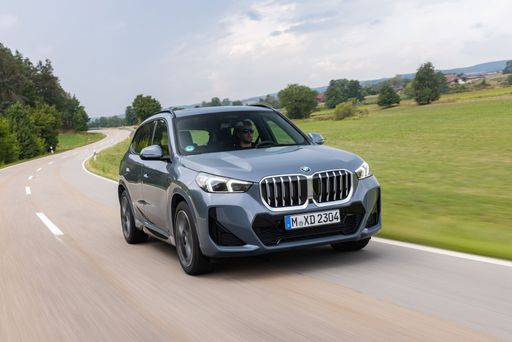
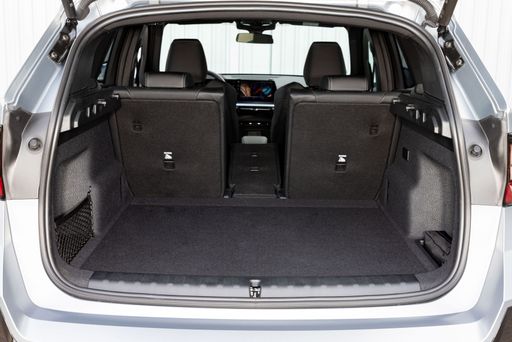
Hyundai Tucson
Hyundai Tucson marries bold, sculpted looks with a clever, roomy cabin that feels smarter than its price tag suggests. It's composed on the road, easy to live with day-to-day, and a sensible choice for buyers who want SUV style without the showroom theatrics.
details




Costs and Consumption |
|
|---|---|
|
Price
38200 - 55500 £
|
Price
20900 - 47900 £
|
|
Consumption L/100km
2.5 - 7.7 L
|
Consumption L/100km
2.7 - 7.6 L
|
|
Consumption kWh/100km
-
|
Consumption kWh/100km
-
|
|
Electric Range
81 km
|
Electric Range
63 - 70 km
|
|
Battery Capacity
14.20 kWh
|
Battery Capacity
-
|
|
co2
57 - 175 g/km
|
co2
62 - 172 g/km
|
|
Fuel tank capacity
47 - 54 L
|
Fuel tank capacity
52 - 54 L
|
Dimensions and Body |
|
|---|---|
|
Body Type
SUV
|
Body Type
SUV
|
|
Seats
5
|
Seats
5
|
|
Doors
5
|
Doors
5
|
|
Curb weight
1575 - 1935 kg
|
Curb weight
1542 - 1893 kg
|
|
Trunk capacity
490 - 540 L
|
Trunk capacity
546 - 620 L
|
|
Length
4500 mm
|
Length
4525 - 4535 mm
|
|
Width
1845 mm
|
Width
1865 mm
|
|
Height
1630 - 1642 mm
|
Height
1650 mm
|
|
Max trunk capacity
1495 - 1545 L
|
Max trunk capacity
1795 - 1799 L
|
|
Payload
490 - 500 kg
|
Payload
518 - 545 kg
|
Engine and Performance |
|
|---|---|
|
Engine Type
Diesel MHEV, Petrol MHEV, Petrol, Diesel, Plugin Hybrid
|
Engine Type
Petrol, Full Hybrid, Plugin Hybrid, Diesel MHEV
|
|
Transmission
Automatic
|
Transmission
Manuel, Automatic
|
|
Transmission Detail
Dual-Clutch Automatic
|
Transmission Detail
Manual Gearbox, Dual-Clutch Automatic, Automatic Gearbox
|
|
Drive Type
Front-Wheel Drive, All-Wheel Drive
|
Drive Type
Front-Wheel Drive, All-Wheel Drive
|
|
Power HP
136 - 326 HP
|
Power HP
136 - 288 HP
|
|
Acceleration 0-100km/h
5.4 - 9.2 s
|
Acceleration 0-100km/h
7.5 - 11.6 s
|
|
Max Speed
190 - 233 km/h
|
Max Speed
196 - 204 km/h
|
|
Torque
230 - 477 Nm
|
Torque
250 - 379 Nm
|
|
Number of Cylinders
3 - 4
|
Number of Cylinders
4
|
|
Power kW
100 - 240 kW
|
Power kW
100 - 212 kW
|
|
Engine capacity
1499 - 1998 cm3
|
Engine capacity
1598 cm3
|
General |
|
|---|---|
|
Model Year
2024 - 2025
|
Model Year
2025
|
|
CO2 Efficiency Class
D, E, F, B
|
CO2 Efficiency Class
F, D, E, B
|
|
Brand
BMW
|
Brand
Hyundai
|
Is the BMW X1 offered with different drivetrains?
The BMW X1 is offered with Front-Wheel Drive or All-Wheel Drive.
